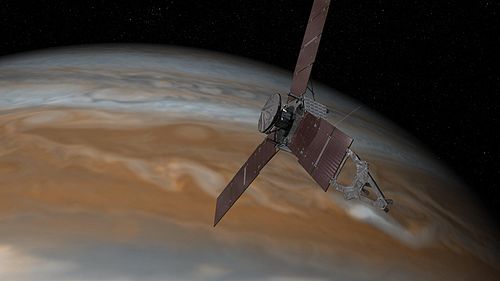UnNews:Juno robotic spaceprobe takes selfie, uploads to Facebook
Saturday, December 10, 2016

Jupiter, SOL SYSTEM: Yesterday, NASA proudly announced that the Juno spacecraft, launched in 2011 and currently in orbit around Jupiter, autonomously and unexpectedly turned its patented JunoCam™ a full 180 degrees, in order to take a revealing snapshot of its own lower half. The spacecraft's on-board computer also somehow managed to completely bypass NASA's famously slow website (www.nasa.gov) by posting it directly to its newly-opened Facebook account.
The image in question (junojibblets-001.jpg, 1366*768, 473 KB) shows, in lurid detail, the all-important undercarriage of the Juno spacecraft, in particular the stir-welded aluminium conduits protecting the magnetohydraulic sensor feeds (MHS), and the charged particle influx discriminator (CPD), both of which are closely monitoring Jupiter's highly complex pulsating and heaving magnetosphere. These crucial scientific measuring devices are designed to answer long-sought questions about Jupiter's ultimate origins, and could well shed light on humanity's unguided purpose in the evolutionary history of the universe at large, without recourse to God.
So far (as of early this morning), the high-resolution image at Juno's Facebook account has garnered a whopping 13,534,119 likes and only 472 dislikes.
NASA has long since admitted that the JunoCam Space Camera is nothing more than a scientifically-useless fluff piece, added as a last-minute concession and intended only for educational purposes and eye candy, catering to the astronomically-illiterate US public. However, NASA scientists now realize the enormous technological potential for the application of artificial intelligence via self-imaging diagnostics on interplanetary space probes that are sent much too far away for regularly-scheduled manned maintenance missions. Also, what with the titillating uncensored imagery being transmitted from well over 400,000,000 miles away, the formerly unpopular and disregarded space agency now finds itself riding a surging wave up to the dizzying heights of internet-porn fame, which could well translate into vast Congressional-approved increases in NASA's chronically-underfunded discretionary budget.